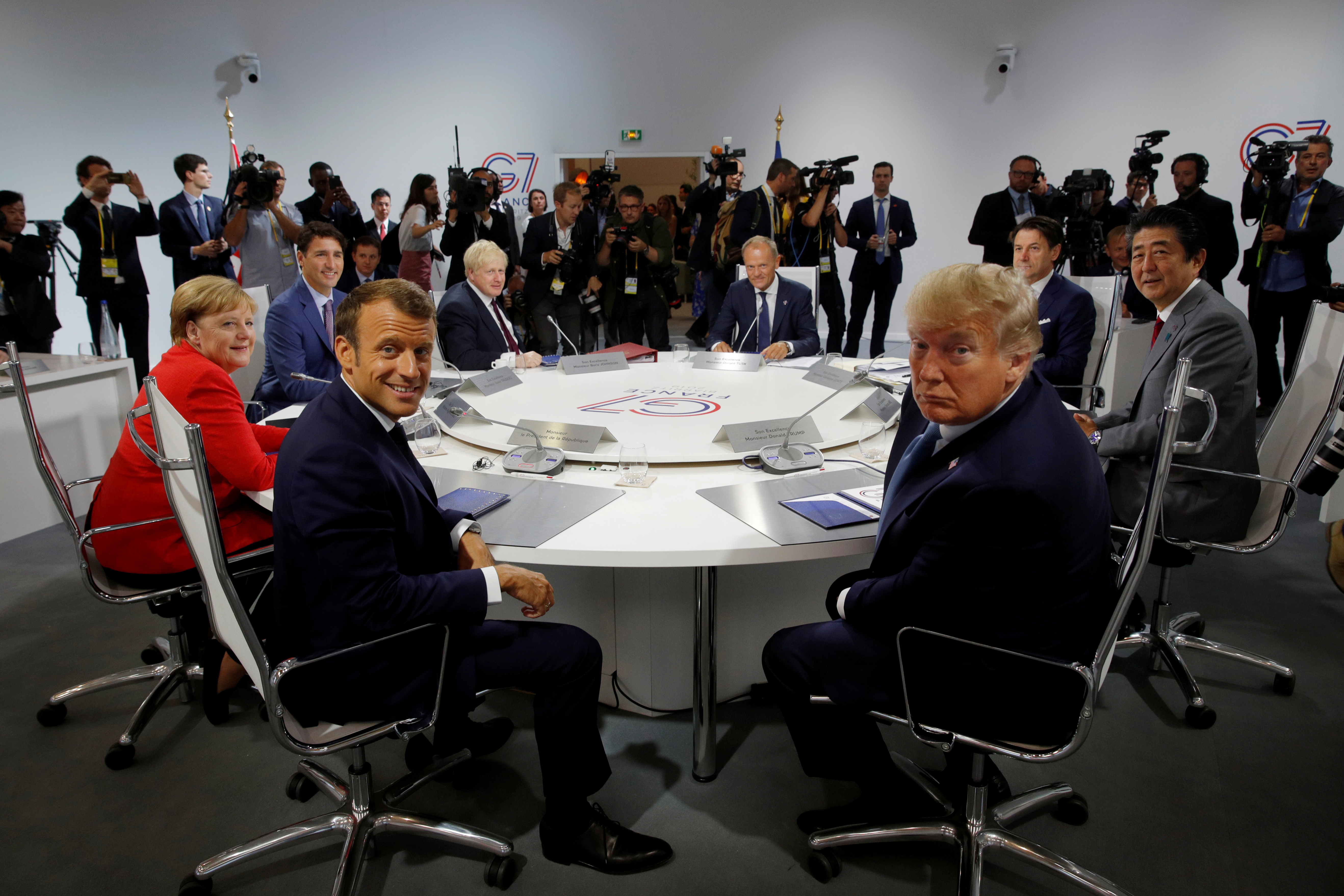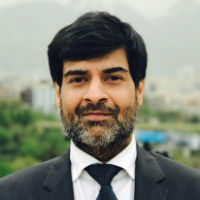Council of Councils global perspectives roundups gather opinions from experts on major international developments. In this edition, members of five leading global think tanks sum up the outcomes of the G7 summit, held in Biarritz, France, from August 24 to 26.

THE BIARRITZ G7 SUMMIT: THE EERIE FEELING OF ITALIAN COMEDY
Group of Seven (G7) leaders who gathered in France’s port town of Biarritz indulged in the revival of the commedia dell’arte, an Italian form of theatrical comedy characterized by stock characters, sketches, and improvisation.
G7 summits used to be carefully orchestrated events meant to provide leaders of the seven wealthy democracies with a platform to find common ground on the most pressing challenges of the time. A generally dull exercise, the meetings still served the purpose of conveying a message of unity. Very little of this was on display in Biarritz.
The host, French President Emmanuel Macron, was so concerned about repeating last year’s disastrous G7 summit, when U.S. President Donald J. Trump withdrew his signature from the final communiqué, that he announced there would be no joint statement this year. And while there were no open quarrels, there was not much agreement either. Trump and the other leaders espoused starkly different views on climate change, the U.S.-China trade war, Russia’s readmission into the G7, and the U.S. exit from the Iran nuclear agreement.
What was striking was the lack of direction, with leaders delivering off-script messages that seemed to pander to their respective domestic audiences rather than seek to forge any consensus
While Trump’s relative isolation in the group is certainly of note, it is hardly the main takeaway from the summit. What was striking was the lack of direction, with leaders delivering off-script messages that seemed to pander to their respective domestic audiences—Macron on climate, Trump on a prospective trade deal with Japan, British Prime Minister Boris Johnson on Brexit—rather than seek to forge any consensus.
Like the characters in an Italian comedy, the G7 leaders handled disagreements with almost nonchalant elegance. Even the surprise visit by Iranian Foreign Minister Mohammed Javad Zarif, who met Macron on the sidelines of the summit, failed to elicit protests from the U.S. delegation—a sign that perhaps the visit was not a surprise after all.
Macron’s later announcement that a meeting between Trump and Iranian President Hassan Rouhani could be in the cards raised hopes for a de-escalation in the Gulf. However, that dealing with major issues such as U.S.-Iran tensions was reduced to a transactional, theatrical game geared toward short-term solutions has an eerie, even disturbing, feeling to it.
Just as commedia dell’arte shone a light on the sorry state of social relations in Italy, so too the Biarritz summit appears to have done little more than relay the regretful state of global governance today.
SEVEN PLUS ONE: INDIA AT THE G7
The latest G7 summit is further evidence that the traditional guarantors of the international liberal order no longer possess the vision or will to sustain it. The divisions among the group’s members runs deep, on issues ranging from trade to climate change to tensions with China, Iran, and Russia. That two successive summits have ended without a joint communiqué suggests that while the G7 remains a gathering of similar, economically consequential states, the group’s politics is deeply fragmented.
The latest G7 summit is further evidence that the traditional guarantors of the international liberal order no longer possess the vision or will to sustain it.
While many blame U.S. President Donald J. Trump’s idiosyncrasies for the sorry state of affairs at the G7, he merely represents the new political normal. Consider the surprise invitation by French President Emmanuel Macron to Iranian Foreign Minister Mohammed Javad Zarif, the announcement of a new U.S.-Japanese trade deal , and British Prime Minister Boris Johnson’s statement on his plan to “talk tough” to the European Union. Each underscores the new reality with which the West will have to contend—individual whims now shape the agenda and outcomes. And that reality will outlast the Trump administration.
India’s presence at the G7 as an observer state is an acknowledgement of another dimension of this new reality. There is a growing realization that revamping the post-war order for the twenty-first century requires new torchbearers, especially from Asia and Africa. In this context, there are three salient observations about India’s diplomacy at the G7.
First, while India has traditionally found the European Union a difficult jurisdiction to navigate diplomatically, a better relationship between the two is emerging as a policy priority. Over the past year, Indian officials have visited the region to strengthen strategic ties. This is a new coalition in the making and deserves more attention.
Second, India’s ability to safeguard its core sovereign concerns even as it deepens its partnership with the West is growing. Issues such as trade, Kashmir, and India’s relations with Russia and Iran were all discussed with G7 members. A decade ago, it was more likely that the G7 would have censured India’s policies. That India set the agenda of these conversations, and that these discussions did not result in discordant press releases, suggests that India is leveraging its heft in the international order. Its message on Kashmir was clear: that is a sovereign issue and New Delhi is in control.
Third, Indian Prime Minister Narendra Modi participated in two sessions at the summit, on climate change and digitization, signaling India’s growing willingness to lead on issues that are points of contention for the transatlantic actors.
Ultimately, the G7, like many other steering mechanisms developed in the twentieth century, is struggling to find relevance in a parochial world order marked by so-called “coalitions of convenience.” For now, New Delhi’s presence at the G7 will go down as another milestone in its rise as a “leading power.”
BIARRITZ: WATERSHED MOMENT?
When historians look at the Biarritz G7 summit in a few years, it may come to be seen as the moment when the United States definitively lost its role as leader of the industrialized world. Long having set activist agendas at these gatherings, the United States led on nothing in Biarritz. One possible exception was the pitch by U.S. President Donald J. Trump to bring Russia back into the group—a proposal firmly rejected by the other participants. Try hard to think of anything else.
When historians look at the Biarritz G7 summit in a few years, it may come to be seen as the moment when the United States definitively lost its role as leader of the industrialized world.
Not only was any U.S. leadership missing, U.S. credibility was severely damaged by lies Trump told throughout the summit. These included Trump’s claim that he put the economy on the agenda (the Wall Street Journal reported that a draft agenda from June showed this was always set to take place), his claims that no one had expressed concerns about U.S. trade wars (even British Prime Minister Boris Johnson, while standing beside Trump demurred), and his claims that North Korea is not breaking any obligations (Japanese Prime Minister Shinzo Abe corrected the record). Trump’s team labeled topics such as climate change as “niche issues” and Trump did not even bother to show up for the climate session. His office said that it was because of bilateral meetings with two heads of government, although those two leaders were in the climate meeting. Trump found himself offside with the other members on virtually every issue. Finally, and perhaps the crowning moment was Trump touting his club in Miami as the site for the next summit.
The other G7 members learned their lesson in previous summits and avoided provoking Trump. He had become irrelevant—an obstacle to be gingerly handled—not a force for positive good. French President Emmanuel Macron chaired admirably and, in particular, managed to make some progress on facilitating a U.S.-Iran dialogue and inducing action on the Amazon Rainforest. Time will tell if these achievements will be sustained, but it showed the new ways G7 members can make progress—by joining together in small groups.
However, on the major issues, particularly climate change and the U.S. lead trade wars that are damaging the global economy, action was limited to talking points and spin. U.S. inaction has left the multilateral system severely damaged. Next year’s G7 summit in the United States and G20 summit in Saudi Arabia hold little promise of reversing this. The question now is whether the 2020 U.S. presidential election will allow the multilateral system to begin to repair itself or whether other countries, largely ignoring the United States, will have to look for new ways to collaborate.
THE DISCREET CHARM OF MACRON’S SUMMITRY
Even before the G7 summit opened in France, German media unanimously reported that the forum had become an empty promise. French President Emmanuel Macron’s decision to drop the traditional communiqué was proof that the group is no longer capable of finding common solutions to the world’s most urgent problems: climate change, trade disputes, and tensions with Iran. But Macron surprised not only U.S. President Donald J. Trump but also his European peers with undeniable diplomatic skill.
In recent months, doubts about the French-German relationship seemed widespread in Berlin policy circles. But in Biarritz, German Chancellor Angela Merkel supported Macron’s endeavors, from increasing political pressure on Brazil and offering $20 million in aid to end fires in the Amazon, to the French leader’s surprise invitation to Iranian Foreign Minister Mohammad Javad Zarif. Discussions between Zarif, his French counterpart, and Macron appear to have paved the way for a possible meeting between Trump and Iranian President Hassan Rohani. Merkel’s statement that she felt “well-informed at all stages” suggests she gave her consent to Macron leading efforts to bring Washington and Tehran back to the negotiating table. If Macron succeeds in convincing Trump to grant Iran some economic relief it will be in the interest of all three European signatories to the Iran nuclear agreement.
Also apparent at Biarritz was that the United Kingdom’s interests in critical policy matters, including Iran, largely overlap with those of the European Union. Apart from quarrels over how large a bill London is willing to pay upon leaving the European Union, British Prime Minister Boris Johnson seemed to be aligned with his partners on the continent on major foreign policy issues at the summit. Even highly anticipated talks between Johnson and Trump on a prospective bilateral trade agreement did little to rile the other European leaders.
Despite Macron’s undeniable successes in Biarritz, critics of the G7’s relevance may turn out to be right... it is hard to look past the challenges the summit did not even touch on, at least in public statements...
Despite Macron’s undeniable successes in Biarritz, critics of the G7’s relevance may turn out to be right. First, it is unclear how long the summit’s achievements will last. Brazilian President Jair Bolsonaro’s rejection of a G7 package for the Amazon served as a quick reminder of how easily cooperation even among the most powerful countries can fail. Second, it is hard to look past the challenges the summit did not even touch on, at least not in public statements: the crisis in Hong Kong, Italy’s worrying political and economic instability, and the threat of a global trade war turning into a currency war, to name just three.
THREE INITIAL LESSONS FROM THE G7 SUMMIT IN BIARRITZ
France played host to a much anticipated G7 summit over the weekend, where the world’s leading industrialized democracies were challenged to overcome disharmony in the absence of a joint communiqué or plan of action. Three main lessons should be taken from this year’s G7 summit.
First, despite the fact that the share of G7 countries’ global economic output is dwindling, the forum remains a powerful tool for sending a message on the future of the international liberal order and the values these countries seek to promote. Inertia, disunity, and lack of G7 leadership only strengthens the hand of strategic competitors, who will attempt to exploit divergences to their benefit. It is also a bad sign for countries that rely on Western solidarity and leadership.
Inertia, disunity, and lack of G7 leadership only strengthens the hand of strategic competitors, who will attempt to exploit divergences to their benefit. It is also a bad sign for countries that rely on Western solidarity and leadership.
Second, there was a high level of participation from civil society groups on topics ranging from protecting against the disruptive effects of globalization to environmental preservation. The French President Emmanuel Macron made great efforts to gather input from various groups, including women, youth, business leaders, and think tank representatives. This increased participation helps to bolster the legitimacy of G7 meetings.
Third, many global challenges require a coordinated approach, if not a more formal multilateral one. The fires raging in the Amazon reminded G7 leaders that environmental health serves the global common good. Like the protection of the oceans or biodiversity, climate change can only be addressed effectively through a commitment to international cooperation. Yet, Brazilian President Jai Bolsonaro rejected G7 aid for the Amazon, claiming that the group’s demands for action were an infringement on Brazilian sovereignty. Unless every effort is made to promote more cooperative approaches, environmental issues could further fuel international tensions.











